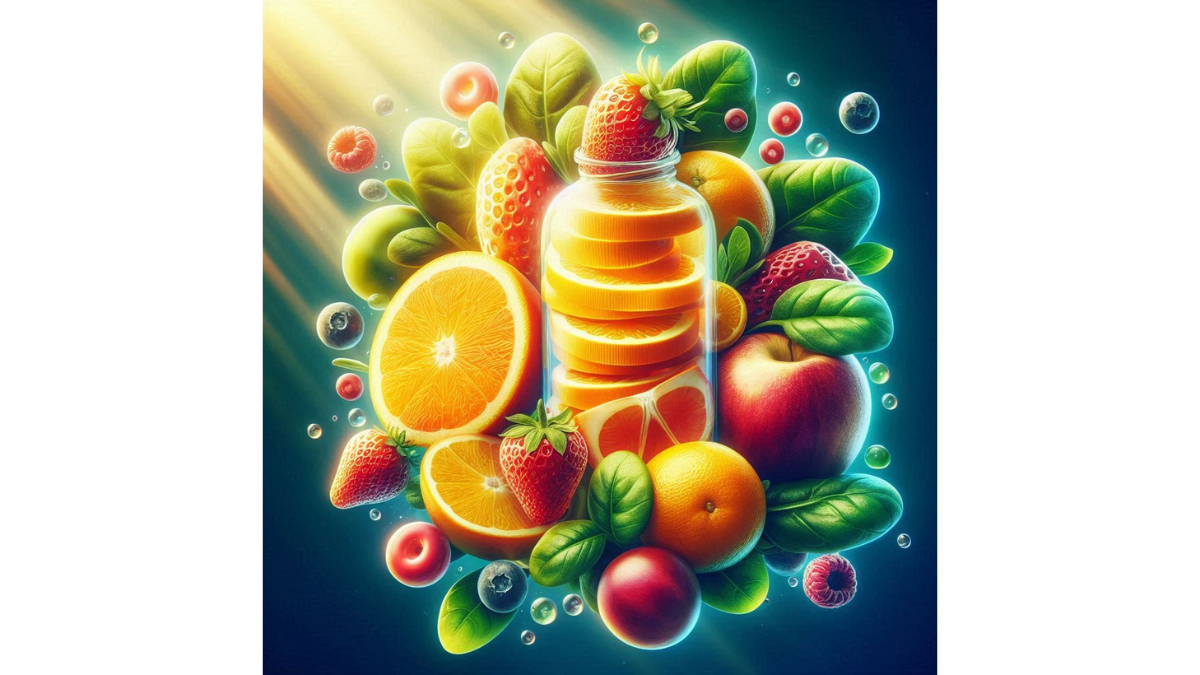Function of water soluble vitamins

Function of water soluble vitamins – When we think about vitamins, our minds often jump straight to the well-known fat-soluble ones, like vitamins A, D, E, and K. However, water-soluble vitamins hold just as much significance in maintaining your well-being. These vitamins dissolve in water and are easily absorbed directly into your bloodstream, ensuring they are quickly available for the body to utilize.
Water-soluble vitamins include the B-complex group and vitamin C. Each of these vitamins plays a unique role in various bodily functions. For instance, B-vitamins are pivotal for energy production and red blood cell formation, while vitamin C boosts your immune system and enhances skin health. Think of them as your body’s unsung heroes, tirelessly working behind the scenes to keep you feeling your best. One of the crucial aspects of water-soluble vitamins is that they are not stored in your body. Unlike fat-soluble vitamins, which can be stored in fatty tissues, excess amounts of water-soluble vitamins are excreted in urine, making it vital to regularly replenish them through a balanced diet.
This characteristic means that if you’re not consuming enough of these essential nutrients, you may be at risk of deficiency, which can manifest in various health issues, from fatigue to weakened immunity. In essence, the function of water-soluble vitamins is integral to sustaining your health. By understanding their importance, you can prioritize their intake, thereby ensuring you thrive both physically and mentally.
Sources and Absorption
Now that you grasp the definition and importance of water-soluble vitamins, the next step is to learn about where to find them and how they’re absorbed by your body. It’s fascinating how nature offers a plethora of sources for these essential vitamins, and incorporating a variety into your meals can be quite delightful. Sources of Water-Soluble Vitamins:
- B Vitamins: These can be found in foods such as:
- Whole grains (brown rice, oats)
- Meat (poultry, fish)
- Legumes (beans, lentils)
- Dairy (milk, yogurt)
- Leafy greens (spinach, kale)
- Nuts and seeds
- Vitamin C: This vitamin is abundant in:
- Citrus fruits (oranges, lemons)
- Berries (strawberries, blueberries)
- Vegetables (bell peppers, broccoli)
- Tomatoes
- Kiwi
Consider adding a colorful salad to your dinner plate. Not only will it be visually appealing, but it will also be packed with multiple water-soluble vitamins. Just imagine the vibrant colors of leafy greens and bright orange carrots coming together! In terms of absorption, water-soluble vitamins are absorbed directly into your bloodstream from the small intestine during digestion. To optimize this process, it’s essential to consume these vitamins with other foods. For example, pairing a vitamin C-rich food, like strawberries, with a source of iron, such as spinach, can enhance your body’s ability to absorb that important mineral. It’s all about creating synergy in your meals! Here’s a quick table summarizing some of the primary water-soluble vitamins, their functions, and good dietary sources:
| Vitamin | Primary Functions | Food Sources |
| Vitamin B1 (Thiamine) | Energy metabolism, nerve function | Whole grains, pork |
| Vitamin B2 (Riboflavin) | Energy production, antioxidant role | Eggs, dairy, green leafy veggies |
| Vitamin B3 (Niacin) | DNA repair, skin health, metabolism | Meat, fish, peanuts |
| Vitamin B5 (Pantothenic acid) | Hormone production | Chicken, avocados, whole grains |
| Vitamin B6 (Pyridoxine) | Amino acid metabolism, supports brain health | Fish, potatoes, bananas |
| Vitamin B7 (Biotin) | Fat and carbohydrate metabolism | Eggs, nuts, seeds |
| Vitamin B9 (Folate) | DNA synthesis, red blood cell production | Leafy greens, legumes |
| Vitamin B12 (Cobalamin) | Red blood cell formation, brain health | Meat, dairy, fortified cereals |
| Vitamin C (Ascorbic Acid) | Antioxidant, immune support | Citrus fruits, strawberries |
As we traverse the wonderful landscape of water-soluble vitamins, it’s clear they are indispensable to our health. Keeping a diverse and colorful diet can help ensure you’re providing your body with the vitamins it needs. With a better understanding of their sources and significance, you’re now better equipped to boost your vitality just by making mindful food choices! In summary, these vitamins deserve attention not just for their roles in bodily functions but also for the joy they can bring to your plates. So, let’s celebrate water-soluble vitamins and make room for them in our daily meals!
Vitamin B Complex
Types and Functions
As we delve deeper into the realm of water-soluble vitamins, one of the standout groups is the Vitamin B Complex. This group comprises several essential vitamins, each playing unique roles in maintaining our health, so it’s pivotal to understand what they are and how they function within our bodies. The Vitamin B Complex includes:
- Vitamin B1 (Thiamine):
- Role: Important for energy metabolism and nerve function.
- Example: Think of it as the fuel for your body’s engine; without adequate thiamine, energy production can grind to a halt.
- Vitamin B2 (Riboflavin):
- Role: Involved in energy production, antioxidant functions, and helps in the metabolism of fats, drugs, and steroids.
- Fun Fact: It also plays a role in maintaining healthy skin and eyes.
- Vitamin B3 (Niacin):
- Role: Supports DNA repair, skin health, and metabolism.
- Here’s a tip: It’s sometimes used therapeutically to help lower cholesterol levels!
- Vitamin B5 (Pantothenic Acid):
- Role: Essential for synthesizing coenzyme A, which is critical for fatty acid metabolism.
- Everyday Example: It contributes to hormone production, aiding our body in stress management.
- Vitamin B6 (Pyridoxine):
- Role: Involved in amino acid metabolism, production of neurotransmitters (chemicals that convey messages in the brain), and immune function.
- Consider this: It’s essential for mood regulation; low levels can sometimes lead to feelings of irritability.
- Vitamin B7 (Biotin):
- Role: Known as the ‘beauty vitamin’, commonly associated with healthy hair, skin, and nails.
- Personal Anecdote: After incorporating more biotin-rich foods into my diet, I noticed my skin had a healthy glow.
- Vitamin B9 (Folate):
- Role: Crucial for DNA synthesis and repair, and plays a prominent role in cell division.
- Important for: Pregnant women especially need adequate folate to support fetal development.
- Vitamin B12 (Cobalamin):
- Role: Vital for red blood cell formation, brain health, and nerve function.
- Key Point: Deficiency in B12 can lead to anemia and neurological issues, making it critical for older adults or those on strict vegan diets.
Each of these B vitamins works in harmony with one another, creating an intricate web that supports your metabolic processes, energy levels, and overall health.
Dietary Recommendations
Incorporating these vital vitamins into your diet isn’t as daunting as it may seem! With a little planning, you can easily ensure you’re getting enough Vitamin B Complex. Here are some dietary recommendations to help you on your journey: Daily Intake Recommendations (based on varying dietary needs):
- Vitamin B1 (Thiamine):
- Men: 1.2 mg, Women: 1.1 mg
- Vitamin B2 (Riboflavin):
- Men: 1.3 mg, Women: 1.1 mg
- Vitamin B3 (Niacin):
- Men: 16 mg, Women: 14 mg
- Vitamin B5 (Pantothenic Acid):
- Adults: 5 mg
- Vitamin B6 (Pyridoxine):
- Men: 1.3–2.0 mg, Women: 1.3–1.5 mg
- Vitamin B7 (Biotin):
- Adults: 30 mcg
- Vitamin B9 (Folate):
- Adults: 400 mcg (600 mcg for pregnant women)
- Vitamin B12 (Cobalamin):
- Adults: 2.4 mcg
Strategies for Incorporating B Vitamins:
- Diversify Your Plate: The more colorful your meals, the higher the likelihood you’re getting a variety of vitamins. Incorporate leafy greens, grains, and proteins.
- Embrace Whole Grains: Foods like brown rice, quinoa, and whole wheat products are excellent sources of various B vitamins.
- Snack Wisely: Nuts and seeds are nutrient-dense snacks rich in B vitamins. A handful can provide a powerful punch of nutrients.
- Plant-Based Focus: If you’re vegan or vegetarian, consider fortified foods or supplements for B12, as it’s predominantly found in animal products.
- Balance Is Key: Don’t forget about the importance of a well-rounded diet that includes healthy fats, proteins, and carbohydrates to support nutrient absorption.
Look for creative recipes – think about a nourishing bowl of quinoa topped with sautéed spinach, chickpeas, and a poached egg, drizzled with a lemon-tahini dressing. Not only does it taste great, but it also ensures you’re packing your plate with an array of B vitamins. In conclusion, the Vitamin B Complex is essential for maintaining optimal health and wellness. By understanding the types and functions, along with incorporating dietary recommendations, you’re well on your way to feeling your best. Let me encourage you to take that extra step and pay attention to how these vitamins positively impact your energy and mood. After all, enhancing your diet can lead to a healthier, more vibrant you!
Vitamin C (Ascorbic Acid)
Benefits and Role in the Body
Continuing on our exploration of water-soluble vitamins, let’s shine a spotlight on one of the most well-known: Vitamin C, also known as ascorbic acid. Chances are you’ve heard plenty about this vitamin—often touted for its potent health benefits, particularly in terms of immune support. But Vitamin C is much more than just a simple immune booster; it plays an integral role in numerous bodily functions. To start with, Vitamin C is a powerful antioxidant. This means it helps combat oxidative stress in your body by neutralizing free radicals—harmful molecules that can lead to chronic diseases and damage your cells. When you think about it, it’s like having a superhero fighting off villains to keep your body healthy. Here are some of the primary benefits of Vitamin C:
- Immune System Support: Vitamin C stimulates the production of white blood cells, which are crucial for fighting infections. So, when you feel a cold coming on, a boost of Vitamin C from fruits like oranges or kiwi can be your secret weapon.
- Collagen Formation: This vitamin is vital for synthesizing collagen, a protein that helps maintain the structure and elasticity of your skin, blood vessels, and connective tissues. As someone who has always been interested in skincare, I can attest to the glowiness that follows when I have enough vitamin C in my diet.
- Wound Healing: Because of its role in collagen formation, Vitamin C aids in wound healing processes. Whether it’s a small cut or a more significant injury, adequate vitamin C can facilitate the recovery process.
- Enhanced Iron Absorption: Pair up your iron-rich foods like spinach or lentils with vitamin C sources, and you’ll increase your body’s ability to absorb iron effectively. This is particularly beneficial for those who may be at risk for iron deficiency.
- Mood Regulation: Studies suggest that Vitamin C may play a role in regulating mood and preventing depression. While it’s not a cure-all, ensuring adequate vitamin C levels can help maintain your emotional well-being.
With such an array of benefits, it’s clear that having sufficient Vitamin C is crucial for your overall health.
Deficiency Symptoms and Risks
Despite its abundance in many fruits and vegetables, Vitamin C deficiency can still occur, especially in populations with limited access to fresh produce, or among individuals with certain dietary restrictions. Recognizing the symptoms of deficiency can help you address potential issues before they escalate. Common symptoms of Vitamin C deficiency include:
- Fatigue and Weakness: You may feel unusually tired or lack the energy to engage in daily activities. It’s like carrying a heavy weight wherever you go.
- Skin Changes: Since Vitamin C is crucial for collagen production, you might notice dry, rough skin or a lack of overall radiance. For those who value skincare, this can be particularly disheartening.
- Frequent Infections: If colds and other infections are a regular occurrence, this may signal low vitamin C levels affecting your immune system.
- Bleeding Gums: One of the hallmark signs of a severe deficiency is swollen or bleeding gums—known as scurvy. This symptom occurs because your body lacks collagen to maintain gum strength.
- Joint Pain or Swelling: Collagen deficiency can impact tendons and connective tissues, leading to discomfort and stiffness in the joints.
It’s essential to understand that long-term vitamin C deficiency can lead to serious health risks, including scurvy. Scurvy is a disease characterized by weakness, pain in the limbs, and bleeding from the mucous membranes among others. While it’s rare today, it serves as a reminder of how vital this vitamin is for our survival. To maintain optimal vitamin C levels, aim for a balanced diet rich in fruits and vegetables. Good sources include:
- Citrus fruits (oranges, lemons)
- Berries (strawberries, raspberries)
- Kiwi
- Bell peppers
- Broccoli
- Leafy greens (spinach, kale)
Simply incorporating a mixed berry smoothie or a colorful salad with bell peppers and leafy greens into your daily routine can make a significant difference! In conclusion, Vitamin C is not just a trendy supplement; it plays numerous critical roles in keeping your body healthy and functional. By ensuring you’re consuming enough Vitamin C through a vibrant diet rich in fruits and vegetables, you can effectively support your immune system, enhance skin health, and feel more energized. So, the next time you peel an orange or toss berries into your breakfast, take a moment to appreciate what these little nutritional powerhouses are doing for your body. After all, your health is your wealth!
Biotin and Pantothenic Acid
Functions and Metabolism
As we continue our exploration of water-soluble vitamins, let’s turn our attention to two lesser-known but equally important members of the B-vitamin family: biotin and pantothenic acid. Both of these vitamins play crucial roles in various metabolic processes that keep your body running smoothly, and they’re especially celebrated for their impact on skin, hair, and overall metabolic health. Biotin (Vitamin H): Biotin is often associated with beauty due to its reputation for promoting healthy hair, skin, and nails. However, its functions go much deeper than aesthetics.
- Energy Metabolism: Biotin is a key player in carbohydrate, fat, and protein metabolism. It acts as a coenzyme that helps convert food into energy, making it crucial for maintaining energy levels throughout the day.
- Gene Regulation: Beyond energy, biotin assists in the regulation of genes involved in cellular growth and development. It helps your body create DNA, ensuring that your cells function properly.
- Skin Health: Anecdotally, many people notice a difference in skin texture and overall health when they have adequate biotin levels. However, while biotin supplements have gained popularity in beauty circles, it’s essential to rely on a balanced diet for better effects.
Pantothenic Acid (Vitamin B5): Pantothenic acid, also known as Vitamin B5, is less famous but extremely vital. It is often referred to as the “anti-stress vitamin” due to its role in synthesizing coenzyme A, which is essential for energy production.
- Fatty Acid Synthesis: Pantothenic acid is pivotal for synthesizing fatty acids. This means it helps your body generate fats needed for energy storage, cell structure, and hormone production.
- Neurotransmitter Synthesis: It also plays a role in forming neurotransmitters such as acetylcholine, which is vital for cognitive function and communication between nerve cells.
- Stress Response: Furthermore, pantothenic acid is crucial in producing adrenal hormones, which help your body respond to stress, making it essential for overall mental well-being.
In short, both biotin and pantothenic acid are deeply intertwined with your body’s metabolic processes, working tirelessly behind the scenes to keep you energized, healthy, and mentally sharp.
Daily Intake and Supplementation
Having explored their functions, let’s discuss how to ensure you’re getting enough biotin and pantothenic acid through your diet and consider if supplementation is necessary. Daily Intake Recommendations: Here are the recommended daily intakes for these vitamins:
- Biotin:
- Adults: 30 mcg
- While this amount might not seem high, it’s crucial for ensuring your body functions optimally.
- Pantothenic Acid:
- Adults: 5 mg
- Similar to biotin, while the required intake isn’t significant, its role in energy production is indispensable.
Food Sources: Both of these vitamins can be easily incorporated into your meals through various food sources. Here’s a helpful list:
- Biotin:
- Eggs (particularly the yolk)
- Nuts (especially almonds and walnuts)
- Legumes (like soybeans and lentils)
- Whole grains
- Cauliflower
- Bananas
- Pantothenic Acid:
- Chicken
- Beef
- Potatoes
- Oats
- Eggs
- Avocados
For example, why not whip up a nourishing breakfast by mixing oatmeal with banana slices and a few walnuts? It will not only be tasty but also pack a punch of biotin and pantothenic acid! Supplementation Considerations: While most people can get enough biotin and pantothenic acid through a balanced diet, there may be situations where supplementation is beneficial, such as:
- Pregnancy or Lactation: Nutritional needs can increase during these stages.
- Certain Health Conditions: If you have a condition affecting nutrient absorption, such as Crohn’s disease or celiac disease, talking to your healthcare provider about supplements can be wise.
- Dietary Restrictions: Vegans or anyone following a restricted diet may find it challenging to meet their needs solely through food sources.
Always consult with a healthcare professional before starting any supplement regimen. Over-supplementation can sometimes lead to unforeseen side effects, so it’s better to err on the side of caution. In conclusion, biotin and pantothenic acid are vital components of your health, supporting everything from your metabolic processes to your skin’s beauty. Understanding the roles they play and ensuring you incorporate enough of these nutrients into your diet will help you maintain energy levels and overall well-being. So next time you enjoy a meal enriched with beans, eggs, or avocados, give yourself a little mental pat on the back for making those nourishing choices! After all, every small action contributes to your vibrant health journey.
Niacin (Vitamin B3) and Riboflavin (Vitamin B2)
Importance for Overall Health
As we wrap up our journey through the world of B-vitamins, let’s focus on two other essential members of this family: niacin (Vitamin B3) and riboflavin (Vitamin B2). While they might not be as spotlighted as their counterparts like B12 or folate, both niacin and riboflavin are vital for your body’s overall health, impacting everything from energy production to skin health. Niacin (Vitamin B3) is crucial for converting food into energy. It plays an integral role in the metabolism of carbohydrates, fats, and proteins, ensuring that your body has the energy it needs to function well. But that isn’t all; niacin is also known for its positive effects on heart health:
- Cholesterol Management: Niacin can help raise HDL (good) cholesterol levels while lowering LDL (bad) cholesterol. This balancing act is essential for reducing cardiovascular disease risks.
- Skin Health: Niacin has anti-inflammatory properties that can help improve skin conditions such as acne and rosacea. It also aids in maintaining hydration and reducing redness.
- Cognitive Function: Adequate niacin levels are linked to brain health, potentially reducing the risk of Alzheimer’s and other cognitive declines.
I remember trying a niacin-rich recipe when I wanted to boost my energy levels for an active day ahead. A grilled chicken salad with avocados and legumes not only fueled my body but left my skin glowing too! Riboflavin (Vitamin B2), on the other hand, is essential for producing energy and breaking down fats, drugs, and steroids. It also plays a key role in maintaining healthy skin, eyes, and nerve functions. Some important aspects of riboflavin include:
- Antioxidant Functions: Riboflavin contributes to the body’s antioxidant defense system, helping to combat oxidative stress and free radicals that can damage cells.
- Blood Cell Production: It is vital in forming red blood cells and supports iron metabolism. This means it can help ward off anemia, ensuring your body has adequate oxygen transport.
- Eye Health: Riboflavin is crucial for preventing cataracts and other eye-related disorders, contributing to clearer vision as you age.
Both niacin and riboflavin, in their unique ways, are essential players in your health. They work synergistically to ensure that your metabolic processes operate smoothly and your body functions optimally.
Food Sources and Recommended Intake
Knowing the importance of these vitamins, you may be wondering how to ensure you’re getting enough of them in your diet. Thankfully, both niacin and riboflavin are found in a variety of foods, making it relatively easy to meet your needs. Recommended Daily Intake: Understanding how much you need each day can guide your dietary choices:
- Niacin (Vitamin B3):
- Men: 16 mg
- Women: 14 mg
- Riboflavin (Vitamin B2):
- Men: 1.3 mg
- Women: 1.1 mg
Food Sources: Incorporating rich sources of niacin and riboflavin into your meals can be delightful and satisfying. Here’s a handy list:
- Niacin Sources:
- Meat (especially turkey and chicken)
- Fish (like tuna and salmon)
- Whole grains (brown rice and barley)
- Nuts (peanuts and sunflower seeds)
- Legumes (lentils and beans)
- Riboflavin Sources:
- Dairy products (milk, yogurt, and cheese)
- Eggs
- Lean meats (beef and pork)
- Green leafy vegetables (spinach and broccoli)
- Fortified cereals
An example of a delicious way to combine both vitamins in your diet is by enjoying a breakfast of scrambled eggs with spinach and a side of whole-grain toast. You can create a hearty, nutritious meal while ensuring you’re meeting your vitamin needs. Here’s a quick comparison table for an easy reference:
| Vitamin | Recommended Intake (Adults) | Key Food Sources |
| Niacin (Vitamin B3) | Men: 16 mg; Women: 14 mg | Meat, fish, whole grains, nuts, legumes |
| Riboflavin (Vitamin B2) | Men: 1.3 mg; Women: 1.1 mg | Dairy, eggs, lean meats, green vegetables |
Supplementation Considerations: If you find it hard to get enough of these vitamins from your diet, consider talking to a healthcare provider about supplementation. While getting nutrients from whole foods is ideal, supplements can help bridge the gap when needed. In conclusion, both niacin and riboflavin are essential components of the B-vitamin family that greatly contribute to your overall health and well-being. By understanding their importance and consciously including rich food sources in your daily meals, you can promote energy production, heart health, skin vitality, and cognitive function. Making small dietary adjustments can lead to big benefits, so why not embrace these vibrant, nutritious foods in your next meal? Your body will thank you!
You might also find this article helpful Bone Health: Building Strong Bones





